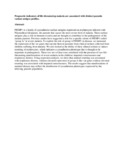| dc.description.abstract | PfEMP1 is a family of cytoadhesive surface antigens expressed on erythrocytes infected with Plasmodium falciparum, the parasite that causes the most severe form of malaria. These surface antigens play a role in immune evasion and are thought to contribute to the pathogenesis of the malaria parasite. Previous studies have suggested a role for a specific subset of PfEMP1 called "group A" in severe malaria. To explore the role of group A PfEMP1 in disease, we measured the expression of the var genes that encode them in parasites from clinical isolates collected from children suffering from malaria. We also looked at the ability of these clinical isolates to induce rosetting of erythrocytes, which indicates a cytoadhesion phenotype that is thought to be important in pathogenesis. These two sets of data were correlated with the presence of two life-threatening manifestations of severe malaria in the children: impaired consciousness and respiratory distress. Using regression analysis, we show that marked rosetting was associated with respiratory distress, whereas elevated expression of group A-like var genes without elevated rosetting was associated with impaired consciousness. The results suggest that manifestations of malarial disease may reflect the distribution of cytoadhesion phenotypes expressed by the infecting parasite population. | en |

